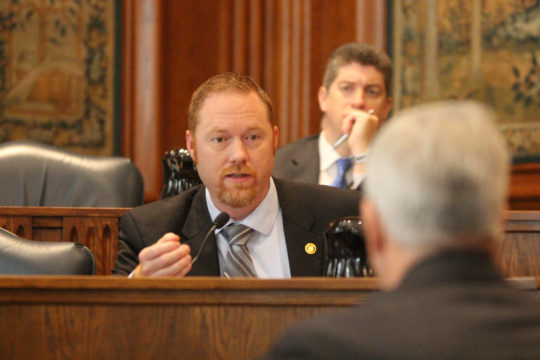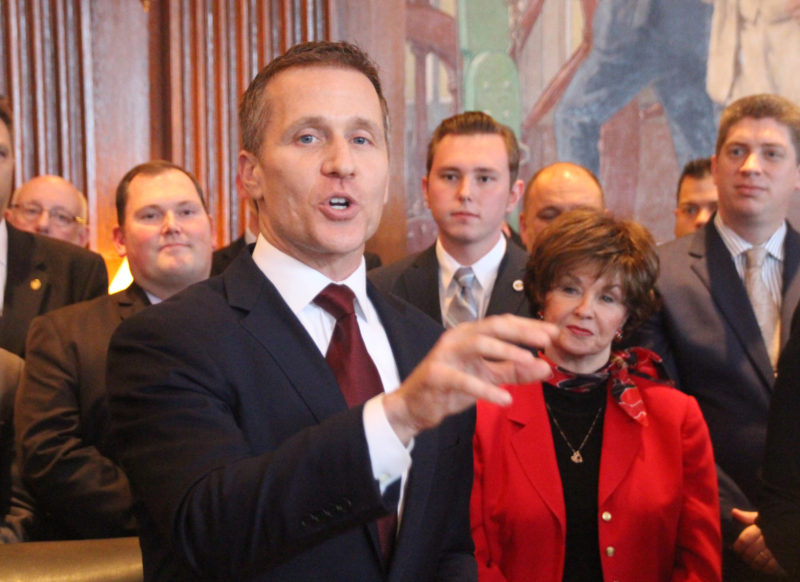JEFFERSON CITY, Mo. – The first extraordinary session came to an end Friday afternoon as the Senate sent an unaltered House bill to bring jobs relief to the Bootheel to the governor’s desk.
It remains to be seen whether or not it was the last extraordinary session of the 2017 interim.
When speaking with host Mark Reardon of The Mark Reardon Show on KMOX Monday, Gov. Eric Greitens did more than just hint that the extraordinary session to give a utility rate adjustment to a steel mill and possible aluminum smelter in Southeast Missouri (and now any facility that uses 50 MW of electricity per month or more) would be the only one this year.
“We’re taking a very serious look at calling extra special sessions,” Greitens said, adding that the General Assembly needed to continue working. “I’m keeping every option on the table because these guys… they need to do their job. We’re going to start with the steel mill special session, and we’ll see where we get.”
Both House Speaker Todd Richardson and Senate President Pro Tem Ron Richard declined to comment on whether they saw a need for added special sessions at their respective chambers’ press conferences this week.
“I’m not the governor, I don’t call them,” Richard said.
Richard later added however that he was not convinced there would be another special session.
Several legislators have asked for special sessions for various pieces of legislation. Rep. Holly Rehder has called for a future special session to pass a prescription drug monitoring bill, and Sen. Bob Onder has called for a special session to overturn a St. Louis ordinance that prevents businesses and renters from discriminating against their reproductive health decisions – a move many anti-abortion advocates make St. Louis an “abortion sanctuary city.”
Other topics could include a lobbyist gift ban bill, a prevailing wage bill, and more tort reform measures.
House Minority Leader Gail McCann Beatty said Wednesday that Gov. Greitens needed to remember that each individual session he calls on a specific issue comes with a price tag that comes out of the state’s budget.
“When you start working up anywhere from $100,000 to $140,000 each, we could have done a single special session to deal all of the issues the governor thought was important,” she said. “Wasting taxpayer dollars is not what we should be doing, and I think the governor needs to think about that first.”

On Reardon’s program, Greitens seemed more to disagree with the nature of the regular session itself and the principle of why legislators were not working year-round. He criticized the idea of a “vacation” for state legislators.
“This idea they can run out the clock with out doing their job and then take the whole summer off, it’s not the right way things should be done,” Greitens told Reardon.
However, the interim is stated plainly in the constitution.
Sen. Jason Holsman, who said on the floor he was missing a wedding his family had attended without him due to the call for an extraordinary session, said there was a reason for that.
“We’re citizen legislators, we’re supposed to have private sector jobs, and in order to have a private sector job, you have to have time to do that job,” Holsman said. “I’m fine with making legislating in Jefferson City my full-time profession, but that’s not what the constitution says.”
If another session takes place in the interim, he will offer a resolution to amend the state constitution to make Missouri a full-time legislature.
Holsman added that barring a natural disaster or something that needed a truly extraordinary response from the representatives of the people of the state, he did not see a need for another special session based on policy failures from this session.
“A bill dying is not extraordinary,” Holsman said. “Bills die all the time every year, thousands of them. Just because one of your agenda items didn’t get done does not constitute an extraordinary call.”
In addition to that point, Sen. Ryan Silvey added that he was not even sure the second part of the governor’s call, which could have allowed for a more broad discussion on ratemaking changes for grid modernization, needed to be discussed during an extraordinary session. Silvey has fought vociferously for years to pass such legislation and even carried a major utility overhaul bill last year.
“When you look at broader legislation that had a chance during regular session and failed, there are a number of members that don’t feel that’s extraordinary,” Silvey said. “When we look at what is extraordinary to be handled outside of regular session, even I have questions about that.”













